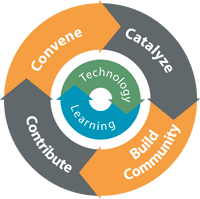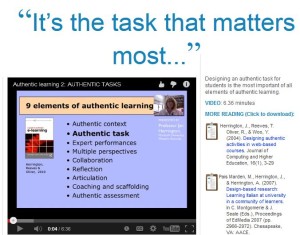 With new technology developments in education constantly increasing and changing, how do you keep up with the latest technology trends for higher education? How do you decide which technologies to implement and how to do this effectively? Where can you find examples of what other universities and faculty are doing? One option is to read the 2014 Higher Education Edition of the Horizon Report, an annual publication of the New Media Consortium (NMC), in collaboration with the EDUCAUSE Learning Initiative (ELI). This annual publication, released early this year, examines key trends, challenges, and specific emerging technologies or practices that are predicted to have a major impact on higher education over the next five years. An international panel of experts in education, technology, and related fields identify the topics that appear in the report.
With new technology developments in education constantly increasing and changing, how do you keep up with the latest technology trends for higher education? How do you decide which technologies to implement and how to do this effectively? Where can you find examples of what other universities and faculty are doing? One option is to read the 2014 Higher Education Edition of the Horizon Report, an annual publication of the New Media Consortium (NMC), in collaboration with the EDUCAUSE Learning Initiative (ELI). This annual publication, released early this year, examines key trends, challenges, and specific emerging technologies or practices that are predicted to have a major impact on higher education over the next five years. An international panel of experts in education, technology, and related fields identify the topics that appear in the report.
The report identifies six key trends grouped by estimated time of impact, six significant challenges grouped by difficulty, and six emerging technologies grouped by estimated time of adoption (1 year or less, 2 to 3 years and 4 to 5 years).
To give some examples, the report identifies key trends such as the “Growing Ubiquity of Social Media” and the “Integration of Online, Hybrid and Collaborative Learning” as likely to drive changes in higher education over the next 1 or 2 years. Significant challenges, according to the report, include “Low Digital Fluency of Faculty” and “Keeping Education Relevant”. Technology identified as having an important impact on higher education for the 1 year or less horizon include the “Flipped Classroom” and “Learning Analytics”. To find out more about these and other trends, challenges, and technologies in the report, you can download a free copy of the report from the New Media Consortium (NMC) here. You can also find out more about the research process behind the report by checking out the Horizon Report’s wiki.
The Horizon Report encourages and inspires discussion and this past May I was able to attend a 2014 Horizon Report Symposium that was presented at NERCOMP (Northeast Regional Computing Program) in Norwood, MA. The symposium, organized and led by Bryan Alexander (one of the Horizon Report’s expert panelists), offered the chance to attend a presentation and to discuss the report and it’s implications with other higher education professionals, including educational technologists, instructional designers, IT professionals, librarians, administrators, and faculty.
The presentation was structured around Bryan Alexander’s wiki resource for the 2014 NERCOMP Horizon Report symposium, which includes links to related articles, websites, videos and more, as well as notes generated from the day’s discussion. Throughout the presentation, participants shared concerns, success stories, and even failures around the implementation of various new technologies. As is often the case, in the end more questions were probably raised then answered, but it’s always helpful to hear issues and examples from other professionals who are working with technology in education.
Following are some key takeaways from the event:
- It’s important to use new technology effectively to meet learning goals, rather than just for the sake of the new technology (even the most promising technology can be used poorly).
- There is a need to devise ways to support faculty in learning new technologies and help them to implement the technologies in effective and beneficial ways.
- There is a need to make sure the use of the technology is of benefit to the students and the learning process (especially in the case of technologies such as learning analytics).
- It’s also important to consider issues of concern, such as distraction (especially with social media and mobile devices), increased faculty workload, student privacy, and digital citizenship, among others.
A quick video overview of this year’s Horizon Report can be viewed at the New Media Consortium’s YouTube channel or below:
If you’d like to explore how some of the key trends and technologies from the Horizon Report can be applied to your own teaching (trends such as “The Growing Ubiquity of Social Media” or “Integration of Online, Hybrid and Collaborative Learning” and technologies such as the “Flipped Classroom”), contact eLIS at elis@lesley.edu.
Source for trends, challenges, and technology examples mentioned from the Horizon Report:
Johnson, L., Adams Becker, S., Estrada, V., Freemam, A. (2014). NMC Horizon Report: 2014 Higher Education Edition. Austin, Texas: The New Media Consortium.

